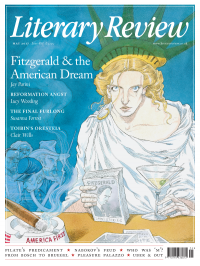Adrian Nathan West
Eastern Approaches
Compass
By Mathias Enard (Translated by Charlotte Mandell)
Fitzcarraldo Editions 475pp £14.99
Throughout his now-ample body of work, Mathias Enard has portrayed travel – on a ferry in Street of Thieves, on a train in Zone and the still-untranslated L’alcool et la nostalgie – as a goad to thought and reflection. In Compass, his most far-reaching and accomplished book and one of the finest European novels in recent memory, the method of conveyance is the mind: dreams woven by opium, wistful visions rendered up by insomnia. In Confessions of an English Opium Eater, which Compass readily evokes, Thomas De Quincey writes, ‘I feel assured that there is no such thing as forgetting possible to the mind.’ Franz Ritter, the narrator of Compass, would probably concur. During a single night spent fretting about his unnamed but possibly fatal illness and cursing the barking of his neighbour’s dog, he offers up, in the midst of musings over Sarah, the object of his barely requited love, an encyclopaedic survey of the intersections between oriental and occidental high culture, together with long excerpts from his imagined masterpiece, entitled On the Divers Forms of Lunacie in the Orient.
Franz is a musicologist, undistinguished but secure, with a university post in his native Vienna; his inamorata is a jobless but world-renowned scholar. Franz’s expertise extends from Beethoven, Mendelssohn and Brahms (‘the Volkswagen of the lullaby’) to Janissary marching music and the ghazals of the Persian poet Hafez. Sarah studies

Sign Up to our newsletter
Receive free articles, highlights from the archive, news, details of prizes, and much more.@Lit_Review
Follow Literary Review on Twitter
Twitter Feed
The era of dollar dominance might be coming to an end. But if not the dollar, which currency will be the backbone of the global economic system?
@HowardJDavies weighs up the alternatives.
Howard Davies - Greenbacks Down, First Editions Up
Howard Davies: Greenbacks Down, First Editions Up - Our Dollar, Your Problem: An Insider’s View of Seven Turbulent...
literaryreview.co.uk
Johannes Gutenberg cut corners at every turn when putting together his bible. How, then, did his creation achieve such renown?
@JosephHone_ investigates.
Joseph Hone - Start the Presses!
Joseph Hone: Start the Presses! - Johannes Gutenberg: A Biography in Books by Eric Marshall White
literaryreview.co.uk
Convinced of her own brilliance, Gertrude Stein wished to be ‘as popular as Gilbert and Sullivan’ and laboured tirelessly to ensure that her celebrity would outlive her.
@sophieolive examines the real Stein.
Sophie Oliver - The Once & Future Genius
Sophie Oliver: The Once & Future Genius - Gertrude Stein: An Afterlife by Francesca Wade
literaryreview.co.uk